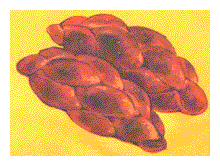|
The Little Kohain
The author discovers a novel minhag -- one of compassion
By Phil Jacobs
EVERY ONCE IN A WHILE, I wander out of my neighborhood on Shabbes.
Sometimes, those wanderings take me to a minyan that, while it's
struggling for members, makes up for it in ruach, or spirit.
Such is the case for this one particular group of men and women. At this
The man seems to be in the comfort of his own religion, of his own
prayers.
A recent moment, however, took me by surprise. We were having a special
kiddush, complete with a steamy cholent and Middle Eastern salads
and delicacies. I saw the man who had blessed the congregation minutes
before put a challah under his coat and walk out the door.
It wasn't just a piece of bread. It was the whole golden-brown braided
loaf. I didn't know what to do. The kohain? How could this be? I
wanted to tell someone. I wanted to approach the kohain and tell him
to replace the loaf. But soon you get caught up in conversation, the
rest of the kiddush-goers get going with song, and nothing is done.
Then, the next time I visit the shul, the "little kohain" comes
up and blesses us again. I can't stay focused because I remember what I
had seen before. In the crowded room of the kiddish later, I can't
stop watching him, as if I'm some sort of detective.
And he does it again!
This time, I went to the shul president. I wanted action. Thou
shalt not steal! Especially on Shabbes! Is nothing sacred or holy?
Then I learned why I need to learn more.
The shul president smiled at me. Sure, he knew about the
challahs. Who do you think has been leaving the extra challahs
out there for the "little kohain?" The man's wife is home in bed,
sick and dying. He spends every moment with her except when he comes to
shul on Saturday. He takes the challah home, says the motzi,
the blessing over bread, and feeds a piece to his wife.
He and his wife are helped by the Jewish agencies. Still, it's not
always going to be enough. No Jewish agency can provide for him what
this small minyan does.
"What's a challah or some extra food for him?" the shul
president asks. "Especially when you consider what he does for us, every
one of us, with the sacred prayers."
I had found out the story behind the story. I learned of this man's
social worker. I wanted to help.
SO MANY TIMES we human beings rush to judgment. The "little
kohain" brings up subjects of charity and how a community goes out
of its way to help. It also addresses how much we have to know more
about a certain person, and are we being more of a help by turning the
other direction? Is it our business to be a whistle-blower when we don't
have enough information?
We can never forget that as neighbors in this living organism we call
the Jewish community, that we have an accountability to the Creator. If
that's too difficult a concept to grasp, then we at least have an
accountability to each other.
The man I call the "little kohain" said: "May the L-rd bless you and
keep you," when he recited the Priestly Blessing, as he fed our
spiritual appetites. Later he said the motzi and passed out small
pieces of challah from the minyan's kiddush table. I quietly put
a couple of pieces in my coat pocket to bring to my wife, who was home
with a cold. The challah was warm and tasted like cake. It was
better than what I had at home.
The "little kohain," though, caught my eye as I did it.
We were now brothers.
 shul, a man that the members affectionately call the "little
kohain," or priest, gets up each Saturday to bless the congregation.
Though not practiced by most of Jewry, such is the minhag, or
custom, of this group.
shul, a man that the members affectionately call the "little
kohain," or priest, gets up each Saturday to bless the congregation.
Though not practiced by most of Jewry, such is the minhag, or
custom, of this group.
Phil Jacobs is editor of the Baltimore Jewish Times.